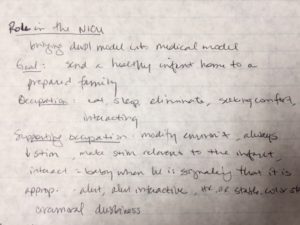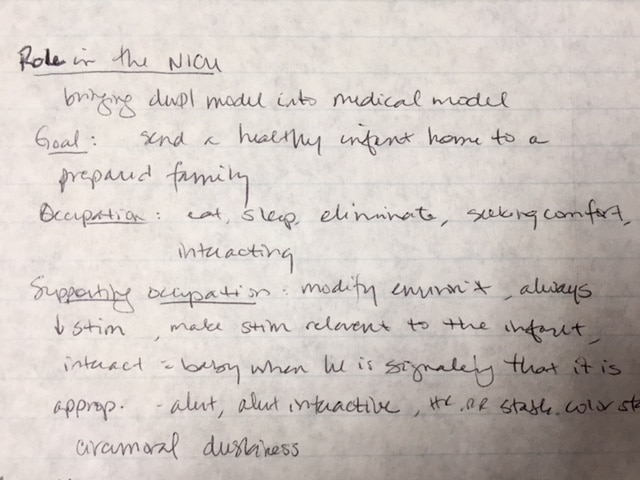Our family is preparing to move soon, just a short jaunt from where we live now. The move spurred us to purge anything we do not love or no longer use. Turns out, that’s a lot of stuff.
While cleaning out the closet of my home office, I unearthed multiple bins of ‘old NICU files’. They included classic articles, conference notes, photographs of myself and colleagues in the ‘old’ scrubs our hospital used in the early 90s, and even a couple of fast flow nipples that were eradicated from the unit in the name of patient safety.
There was a story behind every single item. It was like walking through the history of neonatal care. At first, I felt nostalgic. Then I felt frustrated.
Perhaps you can relate.
 The picture (right) came from said files – a snapshot of course notes from a ‘Therapy in the NICU’ lecture I attended in 1994. Here are a few phrases from that page:
The picture (right) came from said files – a snapshot of course notes from a ‘Therapy in the NICU’ lecture I attended in 1994. Here are a few phrases from that page:
- Therapy role in the NICU is to bring a developmental model into the existing medical model.
- The goal of the NICU stay is to send a healthy infant home with a prepared family.
- We are to modify the environment to make sure stimulation is relevant to the infant and his developmental stage.
- Interact with the baby when he is signaling that it is appropriate.
- Consider his heart rate, respiratory rate, color, overall stability, tone, and alertness to determine if, when, and how to interact.
- Slow, contained movement is supportive.
- Position infant with flexion and boundaries but do not prevent movement.
- Helping parents bond is primary to infant and maternal health and outcomes.
It goes on and on.
The nostalgia came from remembering exactly how excited I was to learn anything about the NICU. The frustration came from the fact that we’re still going to bat for these and similar concepts as if they’re new.
It’s been 23 years since I wrote those notes.
(To be fair, things have improved, but at a snail’s pace. Are we really still battling over things like fast flow nipples? Speechless.)
But here’s what’s truly happening in NICUs: just last week a therapist-and-nurse-team wrote to us and said: Our feeding practice is completely outdated. However, the medical team wants to know if this ‘paying-attention-to-infant-cues-thing is real’ before we go any further.
Sigh.
This is one of the reasons deep breaths were invented. In that moment, you’re right back in 1994.
In those same 23 years huge innovations have been made regarding medications, equipment, respiratory support, surgeries, fetal care (FETAL care!), technology, and more. Those advances and future efforts are needed, appreciated, and lifesaving.
And.
It’s interesting to imagine what could happen if the same priority was placed on simple and effective (and cost effective) practices, many of which we’ve known about since I took those notes. For example, practices that: make infants comfortable, decrease pain, support neurodevelopment, improve parent bonding and parenting skills, incorporate infant cues, improve milk supply, improve feeding pleasure and safety, increase breastfeeding and use of human milk, aid sensory and motor system development, decrease infection, and lead to earlier discharge without compromising safety.
I love innovation and support it whenever able. In fact, innovation is one of NANT’s Core Values.
However, what I love even more is what innovation can do for infants when paired with highly valued, specially trained, team oriented, administratively supported bedside caregivers and providers who work from a common set of standards, practices, and ever-evolving research in an effort to not only save lives, but to improve the quality of lives saved.
Innovation + education = progress. Remove either variable and progress stagnates and/or quality becomes unsustainable.
While I do not have a magic solution, see if this helps, even if just for today…
It is frustrating to be the therapist-nurse team above that takes a deep breath and replies, “Why yes. This reading the infant’s cues thing is real. In fact, we have quite a bit of literature on that topic that we’re happy to share.” But the alternative is to ignore the opportunity for education and find yourselves in the same place 23 years later.
The road toward excellence is long and twisty. The pace at which healthcare moves is wearisome. No one would blame you if you chose to leave it all behind.
But we hope you stay. Remember how you understand that reading infant cues thing? If frustration wins, babies lose. They need you.

